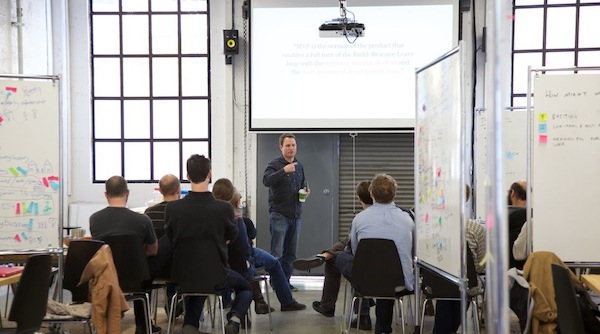

Matter, the startup accelerator focused on media entrepreneurs, just launched its first class, which includes startups focused on interactive publishing, video analytics, and audio storytelling. The six companies selected for the accelerator are spending the next four months at Matter’s development space in San Francisco, honing their products and business plans. Drumroll, please:
The collection of early-to-mid-stage startups will embark on a bootcamp that mixes the atmosphere of Silicon Valley with the mindset and goals of the world of public media — the unusual mix of styles that makes the project so compelling. Each team will receive a $50,000 investment along with coaching from people in the worlds of media and tech, culminating in a final demo day for potential investors in June.
Matter CEO Corey Ford said the selected startups share a common mission based in informing society and engaging communities. “What we wanted to do was build a disruptive playground for media entrepreneurs to build a more connected and empowered society,” he said.
Matter is backed by funding from Knight Foundation and San Francisco’ KQED, both of whom get an equity stake in successful projects. More grounded in the world of venture capital than philanthropy, Matter occupies a different corner of the continuum of journalism funding techniques; the accelerator is focused on creating what Ford calls “feasible, viable, and desirable” products.
“If we want to drive innovation, I think having viability constraints is very important,” Ford told me. The startups at Matter, Ford said, have to push beyond good ideas that can support journalism and focus on creating plans that will make them work in the open market.
It’s like a Y Combinator for people with a public media mindset, in other words. Ford described the program as a series of four one-month sprints, where the teams will be in a constant state of refining and testing their products. The point of bringing together the six companies is to create a sense of community, where the teams can collaborate and learn from each other, Ford said.
Ford’s background is an appropriate mix of public media and Silicon Valley — he’s a former Frontline producer (an Emmy- and duPont -winning one at that) who has taught design thinking at Stanford’s Institute of Design, and he helped create Runway, an incubator program for Eric Schmidt’s Innovation Endeavors. Ford said the idea of design thinking — taking a human-centered approach to developing new products and ideas — is what can connect the worlds of Silicon Valley and media.
A lot has changed since the public media accelerator was first announced in December of 2011. Originally, it was going to be located in Cambridge and be operated as a project out of the Public Radio Exchange (PRX). Jake Shapiro, CEO of PRX and a partner in Matter, said the idea shifted from being a incubator for public media into a for-profit investment firm. Initially the public media accelerator was supposed to be a way to attract the kind of coders, developers, and entrepreneurial talent that was side-stepping the world of media for the tech sector. That’s still the goal, Shapiro said, but it works hand-in-hand with creating investment-ready businesses. “It’s a key part of this — the focus on changing media for good and innovating the industry,” Shapiro said.
Finding and maintaining a balance between the worlds of media and tech will be the key for Matter. Setting up shop on the West Coast means a lot of exposure to the world of Silicon Valley. That’ll be leavened by the resources of Knight and KQED, who can provide knowledge and access to the world of media, Shapiro said.
There is a lot riding on Matter’s first class, from the startups to funders like Knight and KQED. The accelerator represents a shift in media investment for both, with Knight continuing to experiment with tools beyond traditional grantmaking, and KQED looking for potential technology to put to use in its own network.
Ford said Matter represents a new model for investing in media innovation, which means they’ll be building a future not just for the startups, but also the program itself. But he emphasized that Matter is just one part of the ecosystem for developing and supporting new technology and business models in media. “I see everything as prototypes,” Ford said. “I see this as Prototype No. 1.”